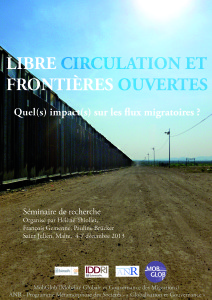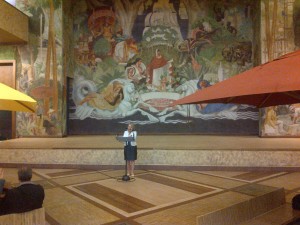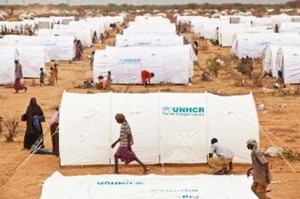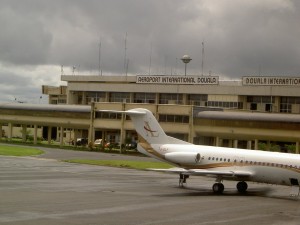Catherine Wihtol de Wenden s’est vue remettre le titre de chevalier de la Légion d’Honneur par Alfred Grosser pour sa brillante carrière de chercheure sur les questions de migration et d’intégration en France et en Europe.
Archives pour la catégorie Page d’accueil
Colloque international UN PAYSAGE GLOBAL DE CAMPS 22, 23, 24 octobre 2014
Avec le soutien de l’Agence nationale de la recherche (ANR MobGlob), de l’Institut de Recherche pour le Développement (IRD) et de la Ville de Paris (Colloques scientifiques internationaux) Organisé autour de la présentation et discussion de l’ouvrage « Un Monde de Camps », sous la direction de Michel Agier (avec la collaboration de Clara Lecadet), ce colloque international invite un riche panel d’intervenants français et internationaux à initier un débat sur les espaces de la mobilité, sur la diffusion de la forme-camp et de ses effets sociaux et politiques, urbanistiques ou architecturaux à l’échelle mondiale.
L’ouvrage Un Monde de Camps, éditions La Découverte. Parution octobre 2014.
Airport ethnography: researching exit and entry controls at the airport in Douala, Cameroon – Fieldwork by Maybrit Jill Alpes (Nov. 2013-Jan. 2014)
From November 2013 to the end of January 2014, my life was to a large determined by the arrival and departure times of Air France flights into the main international airport of Douala in Cameroon. Airports have rhythms and for three months I danced according to the tunes of the work shifts of the Cameroonian police, the constraints of private security staff, and the routines of the French policeman on patrol at the airport.
MobGlob interview of Helene Thiollet for Look Ahead/The Economist
Border control – Q&A
Why migration lags the globalisation of goods, ideas and capital
An interview by Helene Thiollet about migration, borders and governance on the blog of The Economist « Look ahead«
Saudi Migration policy – Article in Saudi Gazette Wednesday, 29 January 2014 – 28 Rabi Al-Awaal 1435 H
Building on a lecture given at the Consulat Français à Djedda on January 21st 2014, the Saudi Gazette has published an interview about my field work in Saudi Sarabia (January 2014).
You can read the full article at Saudi Gazette, interview of Dr Thiollet.
« Libre circulation et frontières ouvertes : Quel(s) impact(s) sur les flux migratoires ? » Séminaire de recherche Saint Julien, Malte, 4-7 décembre 2013
Contact: Pauline Brücker pauline.brucker@sciencespo.fr
Présentation
La libre circulation des personnes, pourtant mentionnée dans la Déclaration Universelle des Droits de l’Homme, reste encore aujourd’hui une utopie politique – ou un cauchemar, selon les points de vue. En matière de droit international public comme de politiques publiques nationales, régionales ou multilatérales, l’asymétrie est évidente entre les pays de départ et les pays d’arrivée des migrants. Si le droit d’émigrer n’est que marginalement contesté au sein de la communauté internationale notamment depuis l’effondrement de l’Union soviétique, le droit d’immigrer relève à l’échelle mondiale de la fiction.
Que se passe-t-il aux frontières ? Emission spéciale à l’occasion du débat du 15 novembre 2013 (lors du forum CNRS Les Fondamentales)
Emission spéciale à l’occasion du débat du 15 novembre 2013 (lors du forum CNRS Les Fondamentales) intitulé : Comprendre la mondialisation : les phénomènes migratoires.
Ou comment l’étude de l’ordinaire cosmopolite des personnes qui font elles-mêmes l’expérience de la frontière permet d’en tirer les conséquences pour comprendre les dimensions à la fois culturelles et politiques de la mondialisation….
Lire la suite
American Political Science Association – 2013 Annual Meeting, Aug. 2013, Chicago
APSA Panel 52-2 Global Migration Governance: The Challenges of Migration Management
Global mobility is woven into the social architecture of globalization and international relations. Global mobility and the institutional responses to this phenomenon are both a cause and an outcome of globalization. Mobility appears to be a point of tension of political modernity at the national and international scales. Yet the governance of mobility remains a unfulfilled ambition that creates and mobilizes social categories. This panel aims to reflect on the practices and experiences of the actors and organisations in charge of the governance of mobility in international relations. Migration flows remain shaped, to a large extent, by the policies and categories defined by those who ambition to control and manage those flows. It is therefore essential to question to very idea of





